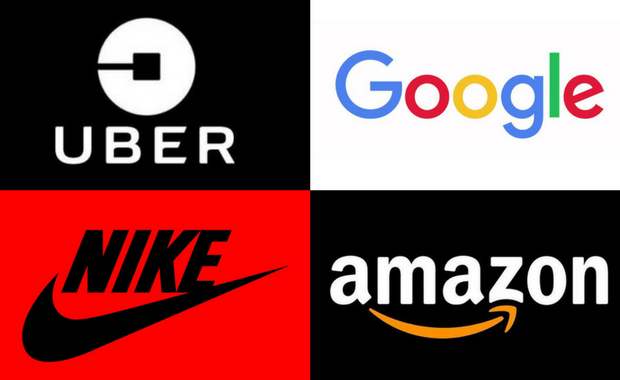Success Advice
5 Things Google, Uber, Nike & Amazon Did to Create Extraordinary Results

Extraordinary businesses are much more about evolution than revolution. Small daily insignificant improvements lead to staggering results over time. Companies such as Google, Uber, Nike and Amazon have not made only one move to amplify their greatness but a series of steps over time. These companies have created un-parallel success due to their belief that success is an inevitable byproduct of doing the little things right. No huge action or silver bullets, instead focusing on achieving legendary business and being better human beings.
The same concept applies, whether it be to companies, or individual performance. Improvements are identified, specific changes are required for the transition and then deliberate immersion until they are automatized.
Important clues hide in the stories of world-renowned creators. Researchers use the term “The Mundanity of Excellence” to describe what makes the best isn’t natural talent or luck but character and the application of a series of simple, specific and learnable methods.
Successful growth companies don’t roll the dice once. When you improve a little each day, eventually big things happen. Invest your energy into seeking the small improvements, small wins, one day at a time and when it happens, it lasts.
Below are 5 principles that when acted upon consistently can lead you to create sustainable results in your business:
1. Played the long game
Media and many within our communities, sensationalize authority figures as overnight success. It rarely exists. Success is captured by thousands of nights in the making, practicing day in and day out and taking countless steps. Bezos attributes Amazon’s success to playing the long game.
When you accept that the journey is not a linear line and you need to work your way there, you take incremental steps to play the long game. Amazon’s first step towards creating the everything store was to focus on selling one thing and one thing only – books. They built one specific product and a strong e-commerce system around it before expanding and diversifying.
2. Thought big, started small
Great companies gather evidence about their capabilities by firing small bullets before they launch a missile. They invest in data to validate where they are heading. They don’t start firing and hope they hit or miss.
When you look back at Google, Larry Page introduced Google Books when he bought a scanner and hooked it up in his office. He began scanning pages, timed it, ran numbers and realized it would be possible to bring book’s online.
Most creators started small. Look at Richard Branson, he started the Virgin Brand with a student magazine. Other examples include Facebook which was started at Harvard and Google started at Stanford with the objective of helping people find information efficiently. Throughout the growth of Google, the company has added more services, yet they continue to focus on one thing only, finding information as quickly as possible.
Amazon dominates different lines of business having little to do with its original undertaking of selling books. Jeff Bezos insists that putting customers first, invent and be patient has been his motto since the beginning.
“Look at things as they can be, not as they are.” – David J. Schwartz
3. Accepted failure as feedback
Failure is inevitable. Humans and business are imperfect. Failure is feedback and opportunity. Fail, but fail early before you invest more than you must or before you compromise your brand. Bezos was interviewed by his brother at Los Angeles’ Summit 2017 where he stated that at the age of 30 he recognized failure was okay but trying was not.
His level of self-awareness allowed him to tap into his courage and take a risk to start an online store. He attributed his success in business due to developing self-reliance and resourcefulness growing up on a ranch. Failure was part of the process, so he mastered that.
4. Found a gap in the market
Uber disrupted the global taxi industry by finding a gap in the market and fulfilled a very real role. Uber removed all the problems associated with taxi services in one fell swoop. They tapped into putting people first by beginning the customer experience through connection of an app to create a personal experience.
They adopted technology at the core and initially focused on raising brand awareness through sponsorship of relevant major events. They harnessed the crowd in the early days with the recommend a friend tactic. They capitalized on social media to the point where the brand became instantly familiar in people’s minds. Step by step, they disrupted the global taxi industry.
“We’ve grown up with internet. We’re able to see things and gaps in markets that others may not be able to.” – Nick D’Aloisio
5. Left a lasting Imprint in people’s minds
“Just do it” is imprinted in the minds of many as is the swoosh logo. In the early days of Nike, putting customers first was paramount. The Nike Moon shoes were a classic example of not only building great products but also highlighting the health benefits of wearing the jogging shoe. The audience wasn’t looking for better running shoes but a better way to get in shape.
Like the other companies identified, Nike has taken small steps over time to significantly impact millions of people. Their brand stands alone, yet they have adapted through upgraded designs, embraced new technologies moving from print to social media platforms and adapted to the needs of their audience.
They continue to hold on to their customer-centric messaging by staying true to their sense of purpose, emphasizing benefits of their products and reinforcing the message that they help their clients be better at what they love to do.
None of these companies sold products, they spread ideas and delivered the benefits that came with it. Over time, they built trust with customers by adding immense value. A style that will never out date.
Which one of these companies is your favorite one and why? Let us know in the comments below!
Success Advice
Wealth Lessons Everyone Should Hear for Every Stage of Your Life
Do you have the courage to rewrite your story?

Do you see what I see? Likely not, as we each see ourselves through the lens of our own story. (more…)
Success Advice
How to Choose the Best Affiliate Programs for Your Blog
If you follow these steps, you can create an affiliate marketing plan that makes money, fits well with your content, and connects with your readers

Picking the right affiliate programs for your blog is really important. It can make a big difference in how much money you can make and how much your readers get out of your blog. With so many choices out there, deciding which ones to go with can be tricky.
This guide is here to make it easier for you. It will give you clear steps and helpful tips to choose affiliate programs that fit well with what your blog is about, what your readers like, and what you stand for.
For more articles on this theme, please head over to this blog https://blog.partners1xbet.com/.
Understanding Affiliate Marketing
Before you start picking affiliate programs, it’s important to really understand what affiliate marketing is and how it works.
Basically, affiliate marketing is when you promote a product or service on your blog, and then you get paid a little bit every time someone buys something or does something because you recommended it.
It’s great for both the person selling the product and the blogger, because the seller gets more sales with low risk, and the blogger can make money from their blog.
How to Choose the Right Affiliate Programs for Your Blog
1. Assess Your Niche and Audience
The key to doing well in affiliate marketing starts with really knowing what your blog is about and who reads it. Consider the following:
- Your blog’s content: What topics do you cover? Ensure the products or services you promote are relevant.
- Your audience’s interests and needs: What solutions are they seeking? Choose affiliate programs that offer products or services that solve their problems or enhance their lives.
2. Research Potential Affiliate Programs
Once you know what your blog is about and what your readers want, start looking for affiliate programs. Choose ones that are well-known for good products, great customer service, and helpful support for affiliates. Resources to find these programs include:
- Affiliate networks like ShareASale, Commission Junction, and ClickBank.
- Direct searches for “[Your Niche] affiliate programs” in search engines.
- Recommendations from other bloggers in your niche.
3. Evaluate the Commission Structure
The commission structure is a critical factor to consider. Look for programs that offer competitive rates that make your efforts worthwhile. Consider:
- The percentage of commission per sale.
- Whether the program offers a flat rate per action (e.g., per sign-up).
- The cookie duration, which affects how long after a click you can earn commissions on sales.
4. Consider the Program’s Reputation and Sureness
Join affiliate programs with a solid reputation for quality and sureness. This not only ensures that you’re promoting good products but also that you’ll be paid on time. You can:
- Read reviews from other affiliates.
- Check the program’s history and background.
- Look for any complaints or issues reported online.
5. Analyze the Support and Resources Offered
A good affiliate program gives you things like ads to use, training on their products, and helpful managers. Having access to these resources can really help you do a better job at promoting their products.
6. Understand the Terms and Conditions
Before signing up, thoroughly review the program’s terms and conditions. Pay close attention to:
- Payment thresholds and methods.
- Any restrictions on how you can promote their products.
- The program’s policy on affiliate marketing on social media platforms.
7. Test the Product or Service
If possible, test the product or service before promoting it. This firsthand experience allows you to offer genuine charge and build trust with your audience.
8. Look for Recurring Commission Opportunities
Some affiliate programs pay you again and again for subscriptions or services that charge fees regularly. These can provide a more stable income compared to one-time sales commissions.
Implementing Your Choice
After choosing the best affiliate programs, the next step is to smoothly include your affiliate marketing in your content plan. This includes:
- Creating valuable content that naturally incorporates affiliate links.
- Disclosing your affiliate affairs transparently to maintain trust with your audience.
- Tracking your results to understand what works best for your audience and adjusting your strategy accordingly.
Picking the best affiliate programs for your blog involves careful planning, research, and making sure they match what your audience likes and needs.
If you follow these steps, you can create an affiliate marketing plan that makes money, fits well with your content, and connects with your readers.
The real key to doing well with affiliate marketing isn’t just about the products you talk about, but also how much your audience trusts and values your advice.
With enough time, patience, and hard work, your blog can grow into a successful space that earns a good amount of affiliate money and helps your readers choose the right products.
Success Advice
The Power of Ethical Leadership: How Integrity Drives Success
By leading with integrity and ethics, leaders create an environment where employees feel excited to come to work

What differentiates a positive organizational culture that enjoys a clean reputation and long-term success from a toxic culture drowning in scandals, mistrust, and legal fines? (more…)
Success Advice
10 Landing Page Hacks Experts Are Using to Generate Leads
Crafting a landing page that converts is both an art and a science

If you are in the online marketing world, you know the importance of a high-quality landing page. It’s like a secret sauce that can turn a casual user into a solid lead. I will walk you through ten great tips that have worked wonders for me and could do the same for you in creating landing pages that generate leads. (more…)
-

 Success Advice4 weeks ago
Success Advice4 weeks agoAn Easy to Follow 8 Step Strategy for Creative Problem Solving
-

 Entrepreneurs4 weeks ago
Entrepreneurs4 weeks agoCrisis-Proof Your Business Now: Essential Strategies for Every Entrepreneur
-

 Success Advice3 weeks ago
Success Advice3 weeks ago10 Landing Page Hacks Experts Are Using to Generate Leads
-

 Entrepreneurs3 weeks ago
Entrepreneurs3 weeks agoThe Mindset Shifts Required to Become a Successful Online Entrepreneur
-

 Success Advice2 weeks ago
Success Advice2 weeks agoThe Power of Ethical Leadership: How Integrity Drives Success
-

 Entrepreneurs2 weeks ago
Entrepreneurs2 weeks ago6 Hacks to Boost Your Productivity as a Business Owner
-

 Success Advice2 weeks ago
Success Advice2 weeks agoHow to Choose the Best Affiliate Programs for Your Blog
-

 Entrepreneurs2 weeks ago
Entrepreneurs2 weeks ago5 Important Legal Tips Every Entrepreneur Should Know






























2 Comments